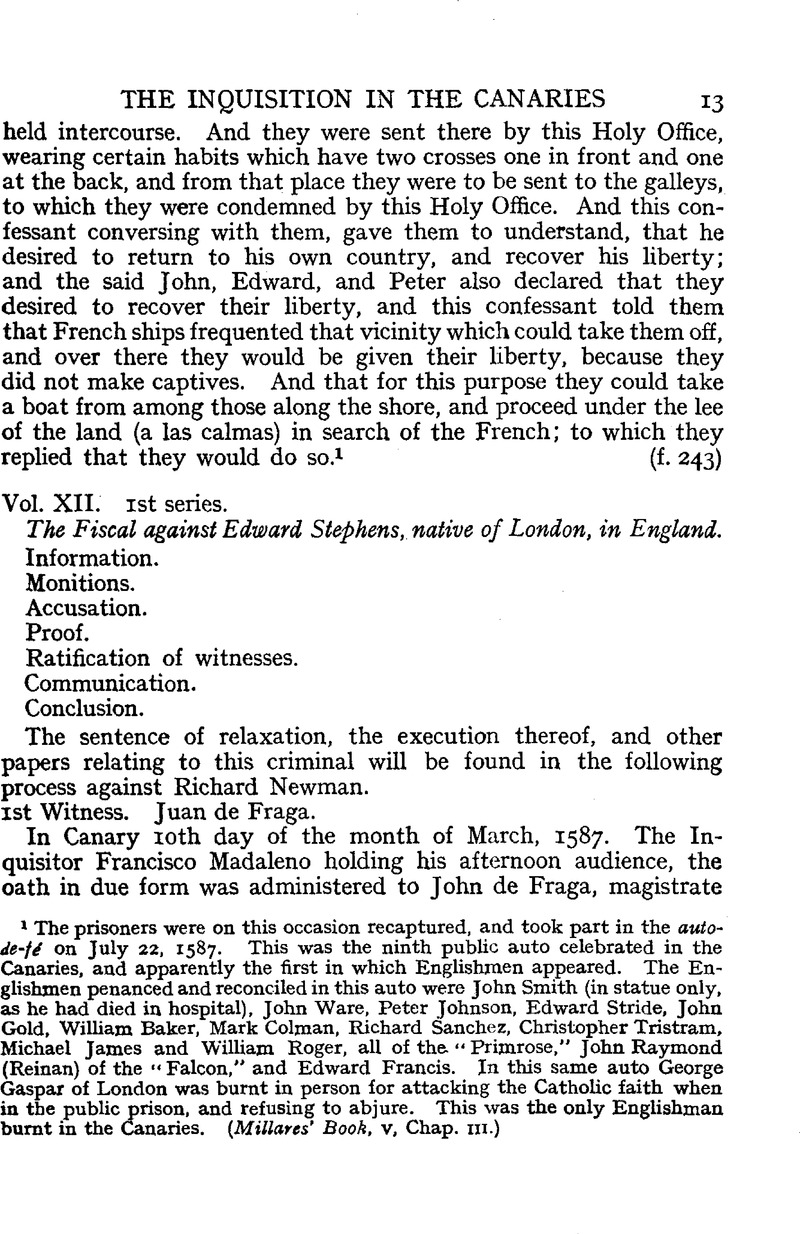Article contents
The Fiscal against Edward Stephens, native of London, in England
Published online by Cambridge University Press: 24 December 2009
Abstract

- Type
- The Inquisition in the Canaries: I. English Text
- Information
- Copyright
- Copyright © Royal Historical Society 1912
References
page 13 note 1 The prisoners were on this occasion recaptured, and took part in the auto-de-fé on July 22, 1587. This was the ninth public auto celebrated in the Canaries, and apparently the first in which Englishmen appeared. The Englishmen penanced and reconciled in this auto were John Smith (in statue only, as he had died in hospital), John Ware, Peter Johnson, Edward Stride, John Gold, William Baker, Mark Colman, Richard Sanchez, Christopher Tristram, Michael James and William Roger, all of the “ Primrose,” John Raymond (Reinan) of the “ Falcon,” and Edward Francis. In this same auto George Gaspar of London was burnt in person for attacking the Catholic faith when in the public prison, and refusing to abjure. This was the only Englishman burnt in the Canaries. (Millares' Book, v, Chap, III.)
page 14 note 1 See Appendix Note A.
page 14 note 2 See Appendix Note B.
page 15 note 1 Ordnance of various kinds and “ wildfire “ were an English specialty at this time; so much so that the Duke of Parma a few years later was reported to have employed an Englishman to make “ wildfires.” (Cal. Dom. St. P. Eliz., 1594, p. 426.) For further information, see J. S. Corbett, Spanish War,1585–7 (Navy Records Soc. pub.), p. 335, etc.
page 17 note 1 This evidence is given on March 12, 1587, and the arrests must have been made somewhere about February 18 or 20. War had been declared between Spain and England in July, 1585, and in May, 1586, English goods had been prohibited there. (Dom. St. P. Eliz., vol. 180, No. 25 and vol. 189, No. 24.) For some time Elizabeth refused to acknowledge the existence of the war, but in a proclamation of March 12, 1585–6, while still maintaining that England was at peace with Spain, she sanctioned reprisals; and as her sailors seemed disposed to extend these reprisals to all ships which they chose to believe were loaded with Spanish goods, she expressly declared that they were to go to Spain and the islands and there seize on Spanish ships only. (See Proclamation in British Museum.) Hence the authorities in the Canary Islands had no need to seek for excuses for arresting Englishmen, at all events. The political situation made it their obvious course, and that they should think any justification required speaks volumes for the laxity of the connexion between Spain and even the nearest of her dependencies.
page 19 note 1 At this date the Inquisitor General was Cardinal Gaspar de Quiroga, Archbishop of Toledo, who held office from 1573 to 1594.
page 19 note 2 One of these Englishmen, being asked his opinion as to the Queen's right to the title of Defender of the Faith, replied that it was a title always held by the Sovereigns of England, and that the Queen retained it because nobody cares to lose a good thing (“ las cosas buenas no las quieren perder ”).
page 21 note 1 The Concejo de la Suprema y General Inquisicion, more often called the Suprema, was first established in 1483 with Torquemada as president. It gradually became more and more absolute, until all the tribunals were entirely subordinate to it.
page 22 note 1 See note p. 17.
page 22 note 2 Cardinal Albert, Archduke of Austria, brother of Rudolph II, appointed Governor of Portugal by Philip II.
page 22 note 3 See Appendix A.
page 23 note 1 San-benito, a corruption of saco bendito (blessed sack), so called because it was customary in early times to bless the sack in which penitents were to be vested. The san-benitos varied according to the degree of guilt and of punishment. There were in all six kinds. (Llorente, vol. II, p. 201.)
page 23 note 2 Further evidence was given on the same subject, and edicts were promulgated summoning them to return within thirty days. John Ware and Edward Stride escaped twice and were recaptured, but at this their third attempt they succeeded in getting off the islands. Examined as to his motive in escaping, whether it was to return to England to follow the new religion, Stride declared that his intention was to escape the galleys and go to France or Lisbon to live as a Christian.
- 1
- Cited by


